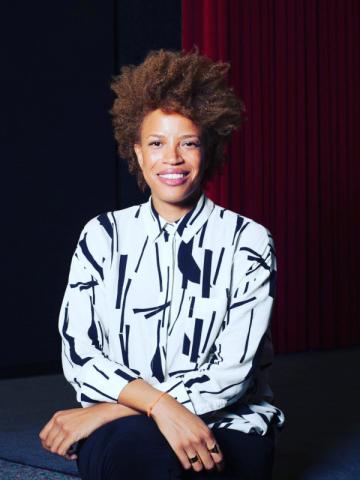End of the World as We Know It / Ici s’achève le monde connu
by Anne-Sophie Nanki
2022, Guadeloupe, 25 mins
1 pm on Sept 24, 2023

About the movie
English—1645. Ibátali, a young Kalinago native, meets Olaudah, a Yoruba brown fugitive. She begins a long journey from alienation from colonial society to emancipation. But is she ready to pay the heavy price of freedom?
Français – 1645. Les guerres opposant Amérindiens et Français font rage en Guadeloupe. Ibátali, une jeune autochtone Kalinago, rencontre Olaudah, un fugitif marron Yoruba. Elle entame un long chemin la menant de l’aliénation à la société coloniale à l’émancipation. Mais est-elle prête à payer le lourd prix de la liberté ?
About the director

English — Anne-Sophie Nanki is an Afro-Caribbean director and screenwriter from Guadeloupe, alumni of the Université La Sorbonne Nouvelle. She has collaborated on the writing of shorts, series and feature films, including Sextape
(Cannes Film Festival 2018). She worked with Raoul Peck on his docu-series Exterminer toutes ces brutes (HBO 2021). In 2022, she directed her first short film, the historical drama Ici s’achève le monde connu, an intimate counter-history of the conquest of this paradise told in a fresh and original way: through the point of view of a young Amerindian woman. The short film won 15 awards in the U.S., the Caribbean, Africa and Europe Europe since its premiere at the Rhode Island Festival in August 2022, where Anne-Sophie Nanki won the Grand Prize -Best Director. She is currently developing Ici begins the new world: this feature film, adaptation of her first short film, has been selected by the EFM Fiction Toolbox Program at Berlinale 2023. She is also working on In hindsight, a mini-series which she will also direct. It a darkly humorous contemporary urban anthology, adapted from her second film, White Spirit, a short film commissioned by Amazon Prime Video, online on the platform since March 2023. Finally, she is writing an African queer comedy The Heights of Kigali, the love story and tribulations of two Rwandan women who are building a family. Anne-Sophie Nanki is also an active member of the Collectif 50/50 and a three-year mentor in the mentoring program by Netflix. She is a member of the Advisory Board of the Center for Black European Studies and the Atlantic (CBESA) at Carnegie Mellon University University (USA), Department of Modern Languages.
Français – Anne-Sophie Nanki est une réalisatrice et scénariste Afro-Caribéenne de Guadeloupe, alumni de l’Université La Sorbonne Nouvelle. Elle a collaboré à l’écriture de courts métrages, de séries et de longs métrages dont Sextape (Festival de Cannes 2018). Elle a travaillé avec Raoul Peck sur son docu-série Exterminer toutes ces brutes (HBO 2021). En 2022, elle réalise son premier court métrage, le drame historique Ici s’achève le monde connu, une contre-histoire intime de la conquête de ce paradis racontée d’une manière fraîche et inédite : à travers le point de vue d’une jeune femme amérindienne. Le court métrage a remporté 15 prix aux États-Unis, dans les Caraïbes, en Afrique et en Europe depuis sa première au Festival International du film de Rhode Island en août 2022, où Anne-Sophie Nanki a remporté le Grand Prize -Best Director. Elle développe actuellement Ici commence le nouveau monde : ce long métrage, adaptation de son premier court métrage, a été sélectionnée par l’EFM Fiction Toolbox Program de la Berlinale 2023. En outre, elle travaille sur In hindsight, une mini-série qu’elle réalisera également. Il s’agit d’une anthologie contemporaine et urbaine, à l’humour très noir, adaptation de son deuxième film, White Spirit, un court métrage commandé par Amazon Prime Video, en ligne sur la plateforme depuis mars 2023. Enfin, elle écrit une comédie Queer Africaine The Heights of Kigali, l’histoire d’amour et les tribulations de deux femmes rwandaises qui construisent une famille. Anne-Sophie Nanki est également un membre actif du Collectif 50/50 et un mentor depuis trois ans du programme de mentorat parrainé par Netflix. Elle fait partie du comité consultatif du Center for Black European Studies and
the Atlantic (CBESA) à l’Université Carnegie Mellon (USA), département des langues modernes.
